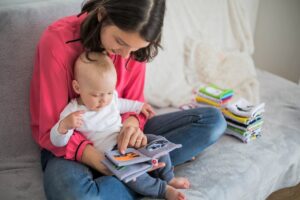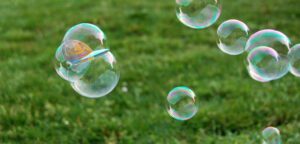Recently updated on June 21st, 2024
A baby’s first year of life is a thrilling period of fast growth and development. Your baby will probably start to become more aware, responsive, and curious in their surroundings by the time they are six months old. She may be smiling, nodding, gurgling, waving, babbling, and moving her hands and legs. While it’s exciting to watch your child pick up new abilities, you also need to be aware of the developmental milestones for her age and may be monitoring her progress. Playing with her, supporting her, showing her gratitude, and establishing a connection with her will be very beneficial to her brain development. Thus, keep in mind that at this point, your affection, touch, attention, and time are essential. Your participation fosters growth and is centered on parent-child communication. Some important 6 months baby activities will be covered in this post to make sure they are growing well.
Table of Contents
ToggleAt six months old, what skills is your child learning?
Monitor your child’s development in the four areas of social and emotional, language and communication, cognitive, and gross and fine motor skills—all of which are essential to a baby’s growth. However, it’s crucial to remember that they are only suggestions. Every baby develops at a different rate.
However, generally speaking, by the time your kid is a half-year-old, they should be working on the following skills:
Emotional and social intelligence
- Recognizes familiar faces and starts to discern whether someone is unfamiliar
- Enjoys playing with people, particularly with guardians and parents
- Enjoys gazing in the mirror
Language and communication skills
- Produces noises in response to sounds
- Responds to her name
Cognitive skills
- Begins to transfer objects from one hand to the other
- Bangs small objects on surfaces
- Rakes small objects with four fingers
Gross and fine motor skills
- Rolls over in both directions (front to back, back to front)
- She begins to sit unassisted
- May bounce when feet are supported on a firm surface
- She rocks back and forth in an attempt to crawl
6 Months Baby Activities for their growth
1. Reading Books

2. Peekaboo Play
3. Clapping
What is required: You and your baby How to: “If you are happy and you know it CLAP YOUR HANDS” If you are happy and you know it and you really want to show it CLAP YOUR HANDS” Clap in front of them and encourage them with the rhymes Skills Developed: Imitation, rhyming4. Talking
What is required: You and your baby How to: Your voice is incredibly soothing to your infant. So enjoy these first few months of talking, reading, singing, and cuddling. React with joy when your infant makes noises or grins. Inform your infant of what you are doing as well as what they are looking at or doing. Name familiar objects as you touch them or bring them to your baby. Skills Developed: Listening abilities, the bond between both of you.5. Contact with Nature
 What is required:
Go outside
How to:
Go outdoors and highlight natural elements like leaves, flowers, or birds. They will get fresh air as well.
Skills Developed:
Enhances visual stimulation, sensory awareness, and curiosity
What is required:
Go outside
How to:
Go outdoors and highlight natural elements like leaves, flowers, or birds. They will get fresh air as well.
Skills Developed:
Enhances visual stimulation, sensory awareness, and curiosity
6. Mirror Play
What is required: A Mirror How to: Place your infant on your lap as you sit in front of a mirror. Try on several expressions and see how they respond in the mirror. Skills Developed: Visual tracking, social interaction, and facial recognition.7. Sit-ups
How to: You can place your baby on her back if she has good head control. After placing your hands beneath her, gently assist her in rising to a sitting posture. Holding her hands, you can force the baby to perform sit-ups as she uses her muscles to rise. Skills Developed: Motor skills and head control8. Fun with Bubbles
 What is required:
Bubble maker or bubble gun
How to:
Blow bubbles with a bubble maker or use a bubble gun when your kid is watching, the baby will quickly stretch their hand to try it out if you try to grab one.
Skills Developed:
Object Tracking and Muscle Development.
What is required:
Bubble maker or bubble gun
How to:
Blow bubbles with a bubble maker or use a bubble gun when your kid is watching, the baby will quickly stretch their hand to try it out if you try to grab one.
Skills Developed:
Object Tracking and Muscle Development.
9. Baby goes bicycling
 What is required:
You and your baby
How to:
Lay the infant down on a padded mat and slowly raise both legs.
As though the infant were pedaling a bicycle, gently bend them and circularly move them. You can also sing a nursery rhyme or a song.
An easy and basic workout to strengthen the muscles in the legs and abdomen.
Skills Developed:
Muscle strength
What is required:
You and your baby
How to:
Lay the infant down on a padded mat and slowly raise both legs.
As though the infant were pedaling a bicycle, gently bend them and circularly move them. You can also sing a nursery rhyme or a song.
An easy and basic workout to strengthen the muscles in the legs and abdomen.
Skills Developed:
Muscle strength

